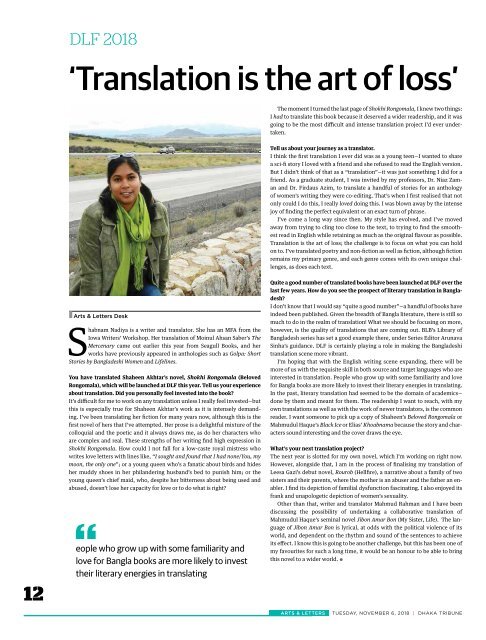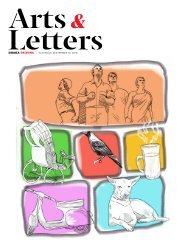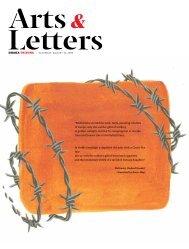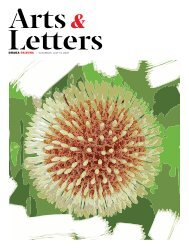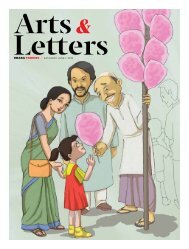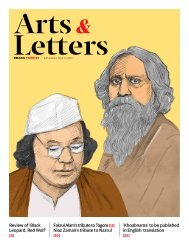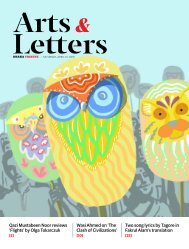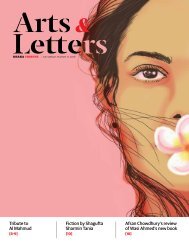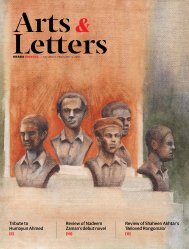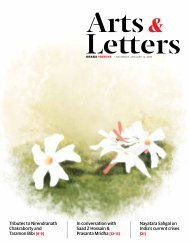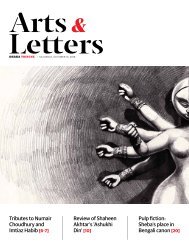A&L Nov_2018
You also want an ePaper? Increase the reach of your titles
YUMPU automatically turns print PDFs into web optimized ePapers that Google loves.
DLF <strong>2018</strong><br />
‘Translation is the art of loss’<br />
The moment I turned the last page of Shokhi Rongomala, I knew two things:<br />
I had to translate this book because it deserved a wider readership, and it was<br />
going to be the most difficult and intense translation project I’d ever undertaken.<br />
Tell us about your journey as a translator.<br />
I think the first translation I ever did was as a young teen—I wanted to share<br />
a sci-fi story I loved with a friend and she refused to read the English version.<br />
But I didn’t think of that as a “translation”—it was just something I did for a<br />
friend. As a graduate student, I was invited by my professors, Dr. Niaz Zaman<br />
and Dr. Firdaus Azim, to translate a handful of stories for an anthology<br />
of women’s writing they were co-editing. That’s when I first realised that not<br />
only could I do this, I really loved doing this. I was blown away by the intense<br />
joy of finding the perfect equivalent or an exact turn of phrase.<br />
I’ve come a long way since then. My style has evolved, and I’ve moved<br />
away from trying to cling too close to the text, to trying to find the smoothest<br />
read in English while retaining as much as the original flavour as possible.<br />
Translation is the art of loss; the challenge is to focus on what you can hold<br />
on to. I’ve translated poetry and non-fiction as well as fiction, although fiction<br />
remains my primary genre, and each genre comes with its own unique challenges,<br />
as does each text.<br />
12<br />
• Arts & Letters Desk<br />
Shabnam Nadiya is a writer and translator. She has an MFA from the<br />
Iowa Writers’ Workshop. Her translation of Moinul Ahsan Saber’s The<br />
Mercenary came out earlier this year from Seagull Books, and her<br />
works have previously appeared in anthologies such as Golpa: Short<br />
Stories by Bangladeshi Women and Lifelines.<br />
You have translated Shaheen Akhtar’s novel, Shokhi Rongomala (Beloved<br />
Rongomala), which will be launched at DLF this year. Tell us your experience<br />
about translation. Did you personally feel invested into the book?<br />
It’s difficult for me to work on any translation unless I really feel invested—but<br />
this is especially true for Shaheen Akhtar’s work as it is intensely demanding.<br />
I’ve been translating her fiction for many years now, although this is the<br />
first novel of hers that I’ve attempted. Her prose is a delightful mixture of the<br />
colloquial and the poetic and it always draws me, as do her characters who<br />
are complex and real. These strengths of her writing find high expression in<br />
Shokhi Rongomala. How could I not fall for a low-caste royal mistress who<br />
writes love letters with lines like, “I sought and found that I had none/You, my<br />
moon, the only one”; or a young queen who’s a fanatic about birds and hides<br />
her muddy shoes in her philandering husband’s bed to punish him; or the<br />
young queen’s chief maid, who, despite her bitterness about being used and<br />
abused, doesn’t lose her capacity for love or to do what is right?<br />
eople who grow up with some familiarity and<br />
love for Bangla books are more likely to invest<br />
their literary energies in translating<br />
Quite a good number of translated books have been launched at DLF over the<br />
last few years. How do you see the prospect of literary translation in Bangladesh?<br />
I don’t know that I would say “quite a good number”—a handful of books have<br />
indeed been published. Given the breadth of Bangla literature, there is still so<br />
much to do in the realm of translation! What we should be focusing on more,<br />
however, is the quality of translations that are coming out. BLB’s Library of<br />
Bangladesh series has set a good ex<strong>amp</strong>le there, under Series Editor Arunava<br />
Sinha’s guidance. DLF is certainly playing a role in making the Bangladeshi<br />
translation scene more vibrant.<br />
I’m hoping that with the English writing scene expanding, there will be<br />
more of us with the requisite skill in both source and target languages who are<br />
interested in translation. People who grow up with some familiarity and love<br />
for Bangla books are more likely to invest their literary energies in translating.<br />
In the past, literary translation had seemed to be the domain of academics—<br />
done by them and meant for them. The readership I want to reach, with my<br />
own translations as well as with the work of newer translators, is the common<br />
reader. I want someone to pick up a copy of Shaheen’s Beloved Rongomala or<br />
Mahmudul Haque’s Black Ice or Elias’ Khoabnama because the story and characters<br />
sound interesting and the cover draws the eye.<br />
What’s your next translation project?<br />
The next year is slotted for my own novel, which I’m working on right now.<br />
However, alongside that, I am in the process of finalising my translation of<br />
Leesa Gazi’s debut novel, Rourob (Hellfire), a narrative about a family of two<br />
sisters and their parents, where the mother is an abuser and the father an enabler.<br />
I find its depiction of familial dysfunction fascinating. I also enjoyed its<br />
frank and unapologetic depiction of women’s sexuality.<br />
Other than that, writer and translator Mahmud Rahman and I have been<br />
discussing the possibility of undertaking a collaborative translation of<br />
Mahmudul Haque’s seminal novel Jibon Amar Bon (My Sister, Life). The language<br />
of Jibon Amar Bon is lyrical, at odds with the political violence of its<br />
world, and dependent on the rhythm and sound of the sentences to achieve<br />
its effect. I know this is going to be another challenge, but this has been one of<br />
my favourites for such a long time, it would be an honour to be able to bring<br />
this novel to a wider world. •<br />
ARTS & LETTERS<br />
TUESDAY, NOVEMBER 6, <strong>2018</strong> | DHAKA TRIBUNE


